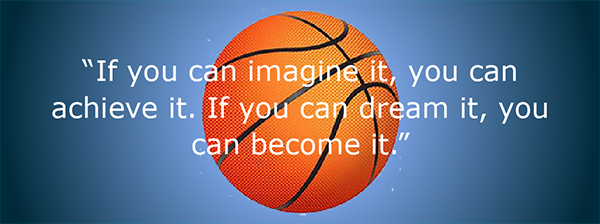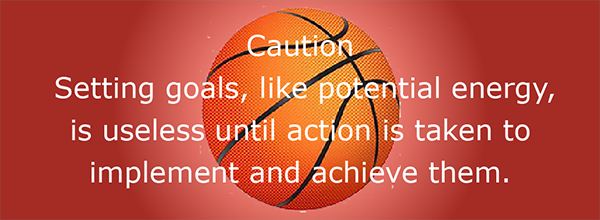- Offensive Techniques & Strategies
Dreams and Goals

Success is not by chance or luck. Successful people have learned the value of setting specific goals and focusing their efforts toward achieving them. “Goals are the bridges that allow you to cross from DREAMS to REALITY.” A player “without goals is like a ship without a rudder.” Goals are what give direction to physical and mental training and improvement. They are the basis of self-motivation and the foundation of all achievements. However, goals must be personal. Something that players, personally, want and have a strong desire to pursue and achieve. It is because of this intense, personal desire to reach goals that will push them through adversity to success.
Accomplishing goals and making dreams come true is incredibly satisfying. However, it is the journey, not the destination, that is the most important and rewarding part of dreams. Players must never stop improving and making it a goal to get better each and every day in some small way. Daily improvements eventually add up to huge gains. They should always keep moving forward setting new goals and dreaming new dreams. Players may never reach their ultimate, long term dream. However, this is irrelevant. The important thing is that they will become like their dreams.
“It is not about the shoes” (1 Minute Video)
Have high ambitions, not expectations. High expectations can only lead to big disappointments. While, on the other hand, high ambitions never get disappointed and are the basis to all success. Players must stay ambitious, making every day the best it can be. One day at a time. The best and most productive place to be is in the present. Too much time thinking about the past causes regret. Too much thinking about the future causes worry.

Seven Steps to Successful Goal Setting

To accomplish your goals you first need to know how to set them. You can't simply say, "I want to" and expect it to happen. Goal setting is a process that starts with careful consideration of what you want to achieve, and ends with a lot of hard work to actually do it. Goal setting not only allows you to take control of your game, it also provides you a benchmark for determining whether you are actually succeeding.
#1: Set Goals that Motivate You
Motivation is the key factor to achieving goals. When you set goals for yourself, it is important that they motivate you. This means making sure that they are important to you, and that there is value in achieving them. If you have little interest in the outcome or if they are irrelevant, the chances of you putting in the work to make them happen are slim to none.
#2: Set Relevant Goals
Goal achievement requires commitment, so to maximize the likelihood of success, you need to feel a sense of urgency and have an "I must do this" attitude. In keeping goals meaningful, you will develop the necessary focus you need to get ahead and do what you want. Without this type of focus, you will end up with inconsistent and fragment goals that will only “dribble away” or squander your time and efforts.
#3: Set Attainable Goals
Make sure that it's possible to achieve the goals you set. If you set a goal that you have no hope of achieving, you will only demoralize yourself and erode your confidence. However, resist the urge to set goals that are too easy. Accomplishing a goal that you didn't have to work hard for can be anticlimactic. However, by setting realistic and challenging goals, you hit the balance you need. These are the types of goals that require you to "raise the bar" and they bring the greatest personal satisfaction.
#4: Set Specific and Measurable Goals
Your goals must be clear and well defined. Vague or generalized goals are unhelpful because they don't provide sufficient direction. Your goals need to show you the way. Make it as easy as you can to get where you want to go by defining precisely where you want to end up.
Be sure to set goals that you have control over. Goals such as making all-league, all-state, or all-American you have no control over. Include precise totals, percentages, quantities, etc. in your goal setting so you can measure your degree of success. If your goal is set without a way to measure your success, you will miss out on the celebration that comes with knowing you have actually achieved your goal.
#5: Set Time-Limited Goals
Your goals must have deadlines or time frames. Again, this means that you know when you can celebrate success. When you are working on a deadline, your sense of urgency increases and achievement will come that much quicker. Group your goals into immediate, short term and long term.
Immediate goals: Specific goals aimed at a specific event or competition occurring today or within a week.
Short term or intermediate goals: May be specific or less defined that require several steps to achieve. Time frame is usually within six months or a season.
Long term goals are your “Dream” or career goals that you wish to achieve. Usually takes years or a lifetime to accomplish.
#6: Set Goals in Writing
Goals are the foundation of your motivation, achievements, and success. Therefore, goal setting is much more than simply saying or thinking what you want to happen. Unless you clearly define exactly what you want and understand why you want it the first place, your odds of success are considerably reduced.
The physical act of writing down a goal makes it real and tangible. You have no excuse for forgetting about it. As you write, use the word "will" instead of "would like to" or "might". Create a goal “To Do” list. Post your goals in visible places to remind yourself every day of what it is you intend to do and accomplish.
#7: Create a Plan of Action and Stick With it.
This step is often missed in the process of goal setting. You get so focused on the outcome that you forget to plan all of the steps that are needed along the way. By writing out the individual steps, and then crossing each one off as you complete it, you'll realize that you are making progress towards your ultimate goal. This is especially important if your goal is big, demanding, or long-term.
Remember, goal setting is a constant, ongoing activity not just a means to an end. Build in reminders to keep yourself on track, and make regular time-slots available to review your goals. As time goes by, your intermediate and long term goals will evolve into short term or immediate goals. Some goals will be achieved, while others will be modified or replaced. The important thing is that you will always have direction.

Return to Player Prerequisites - Click Here
Return to Player Development and Performance - Click Here
© 2026 HoopTactics All Rights Reserved.
